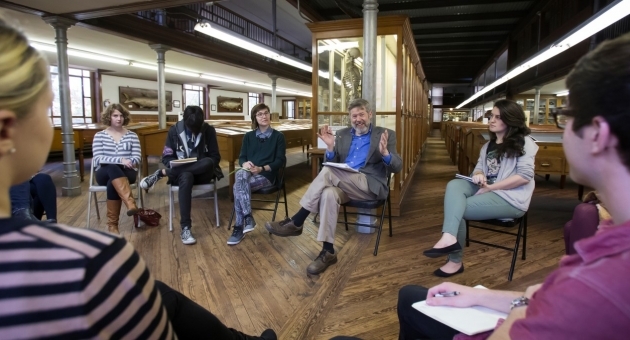Science museum becomes Temple classroom

The Wagner Free Institute of Science is just a few blocks away from Temple University’s Main Campus, yet very few students know the natural history museum exists. Ken Finkel, TYL ’74, ’78, teaching professor in American studies at Temple, hopes to change that. Last semester, Finkel held his Honors section of Museum Studies: Curating Authenticity at the museum.
In the course, students examine the evolution of science museums, so it made sense to Finkel, an advisory board member at the Wagner, to hold class at the location. The institute was created 160 years ago to teach the history of science through educational programs and displays of mounted skeletons, preserved animals, minerals and other artifacts.
“The Wagner was created to literally embody the history of science, the history of culture, the history of collecting. In this class, we are enveloped in the very space that we’re studying, so it becomes a much more powerful experience,” Finkel said.
Studying in the Wagner museum allowed students such as Shannon McDevitt, Class of 2017, an English and Spanish literature major, to better understand Finkel’s teachings on topics such as what role collections of natural history played during the late Victorian era and what role they play today.
“Having a class in the Wagner makes the things we're learning about so much more real,” she said. “When we come into class...we connect aspects of the Wagner that are right in front of us to what we previously read about.”
During one class, Finkel asked students to study the gallery and identify ways the Wagner employs artifacts and information to convey meaning. Whether cases of pinned insects, stuffed mammals, rare minerals or century-old labels, students learned to "read" objects both individually and in various contexts. According to Finkel, this exercise not only helped students acquire analytical skills, it provided a deeper understanding of the museum and its history.
Finkel credits Temple’s Honors Program and its director Ruth Ost for making this class a reality. He also notes that the students’ commitment to learn was an important factor in the class’ overall success.
“This was an experiment,” he said. “The fact that the students were interested and engaged Honors students made the experiment all the more likely to succeed.”
Finkel hopes that classes in the Wagner not only continue but inspire other professors to teach at the Wagner and in other Philadelphia museums.
“It is important to forge a deeper relationship between the university and the Wagner in a way that benefits both,” he said. “This model of a relationship could then be replicated other places throughout the city. Philadelphia is a great city to do this in.”
-Siobhan Redding